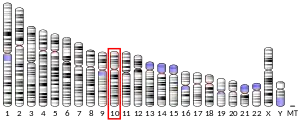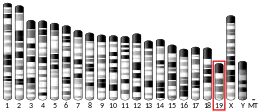Phosphoinositide 3-kinase adapter protein 1 is an enzyme that in humans is encoded by the PIK3AP1 gene.[5][6][7]
References
- 1 2 3 GRCh38: Ensembl release 89: ENSG00000155629 - Ensembl, May 2017
- 1 2 3 GRCm38: Ensembl release 89: ENSMUSG00000025017 - Ensembl, May 2017
- ↑ "Human PubMed Reference:". National Center for Biotechnology Information, U.S. National Library of Medicine.
- ↑ "Mouse PubMed Reference:". National Center for Biotechnology Information, U.S. National Library of Medicine.
- ↑ Edwards JA, Sethi PK, Scoma AJ, Bannerman RM, Frohman LA (Apr 1976). "A new familial syndrome characterized by pigmentary retinopathy, hypogonadism, mental retardation, nerve deafness and glucose intolerance". Am J Med. 60 (1): 23–32. doi:10.1016/0002-9343(76)90529-5. PMID 1251844.
- ↑ Okada T, Maeda A, Iwamatsu A, Gotoh K, Kurosaki T (Jan 2001). "BCAP: the tyrosine kinase substrate that connects B cell receptor to phosphoinositide 3-kinase activation". Immunity. 13 (6): 817–27. doi:10.1016/S1074-7613(00)00079-0. PMID 11163197.
- ↑ "Entrez Gene: PIK3AP1 phosphoinositide-3-kinase adaptor protein 1".
Further reading
- Hartley JL, Temple GF, Brasch MA (2001). "DNA Cloning Using In Vitro Site-Specific Recombination". Genome Res. 10 (11): 1788–95. doi:10.1101/gr.143000. PMC 310948. PMID 11076863.
- Wiemann S, Weil B, Wellenreuther R, et al. (2001). "Toward a Catalog of Human Genes and Proteins: Sequencing and Analysis of 500 Novel Complete Protein Coding Human cDNAs". Genome Res. 11 (3): 422–35. doi:10.1101/gr.GR1547R. PMC 311072. PMID 11230166.
- Strausberg RL, Feingold EA, Grouse LH, et al. (2003). "Generation and initial analysis of more than 15,000 full-length human and mouse cDNA sequences". Proc. Natl. Acad. Sci. U.S.A. 99 (26): 16899–903. Bibcode:2002PNAS...9916899M. doi:10.1073/pnas.242603899. PMC 139241. PMID 12477932.
- Ota T, Suzuki Y, Nishikawa T, et al. (2004). "Complete sequencing and characterization of 21,243 full-length human cDNAs". Nat. Genet. 36 (1): 40–5. doi:10.1038/ng1285. PMID 14702039.
- Wiemann S, Arlt D, Huber W, et al. (2004). "From ORFeome to Biology: A Functional Genomics Pipeline". Genome Res. 14 (10B): 2136–44. doi:10.1101/gr.2576704. PMC 528930. PMID 15489336.
- Maruoka M, Suzuki J, Kawata S, et al. (2005). "Identification of B cell adaptor for PI3-kinase (BCAP) as an Abl interactor 1-regulated substrate of Abl kinases". FEBS Lett. 579 (14): 2986–90. doi:10.1016/j.febslet.2005.04.052. PMID 15893754. S2CID 20802390.
- Mehrle A, Rosenfelder H, Schupp I, et al. (2006). "The LIFEdb database in 2006". Nucleic Acids Res. 34 (Database issue): D415–8. doi:10.1093/nar/gkj139. PMC 1347501. PMID 16381901.
This article is issued from Wikipedia. The text is licensed under Creative Commons - Attribution - Sharealike. Additional terms may apply for the media files.



